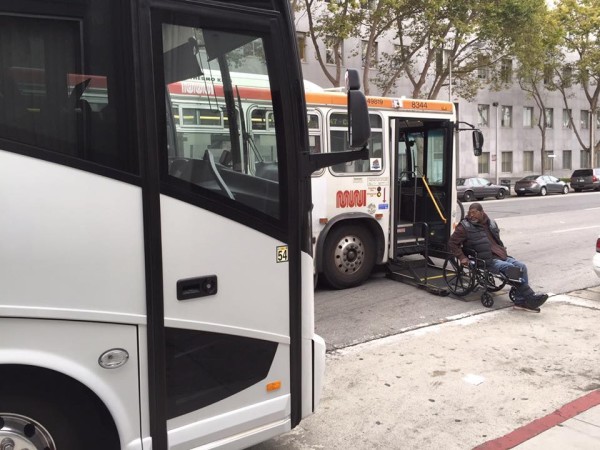The battle over the Google buses continued today, with Sups. Jane Kim and Scott Wiener, who are running for state Senate, showing very different approaches that reflect how their campaigns may shape up.

The issue at the Board of Supes was technical – the Sierra Club and SEIU Local 1021 have appealed the transit shuttle program, demanding a full environmental impact report. Sup. David Campos, who is trying to work out a deal with all parties, asked that the appeal be continued for another two weeks.
The matter was continued two weeks ago, and these sorts of continuation motions are normally routine, particularly when all parties agree that a little additional time may render the appeal moot.
But not today: Wiener immediately announced that he didn’t want a continuance and that the deal was being orchestrated by people who want to destroy the Google buses. “They want to make it so hard for people to use these shuttles that they won’t use them,” he said.
Opposing the continuance made little political sense if his goal was to keep the shuttle program alive. Most observers agree that a full EIR would delay for as much as a year the implementation of the permanent program – and it was pretty clear that if the appeal went forward, there were six voters to uphold it.
In other words, the center of gravity on the board has changed with the election of Sup. Aaron Peskin, and the Google bus deal, as it currently exists, isn’t going to survive.
The tech companies and the bus operators realize that, and were willing to meet with Campos and Sups. London Breed and Norman Yee, along with the Sierra Club and SEIU, to try to reach a compromise.
But Wiener drew a clear line in the sand: He was the supervisor, and the candidate, who fully supports the shuttles, supports the tech industry, supports tech workers who are moving into San Francisco, and doesn’t want to further regulate the buses.
He argued, in fact, that nobody should complain about the tech shuttles causing displacement and gentrification. “This same argument could be made about any public transportation,” he said. “Should we not upgrade Caltrain because that will make it easier for people to get to work?”
Kim had a completely different perspective. While she insisted that nobody on the board wants to shut the program down, the Google buses aren’t like Caltrain: “We are legalizing a private mass transit program that gets to decide who is allowed to ride. We need to set up public regulations.”
She quoted Rebecca Solnit, the prominent local author, as saying the that the tech shuttles are “a roving gated community.”
Kim’s suggestion, which will likely be part of any long-term deal, is that it might make sense to move the large diesel shuttles out of the neighborhoods where they are causing both economic and traffic impacts and setting them up in hubs downtown.
Then, she said, the tech workers “can go downtown on Muni, invest in Muni, buy Muni passes” and ride the fancy wi-fi equipped shuttles on the freeway.
It’s a radical thought – that the wealthy workers who right now don’t have to deal with the rest of us on the public buses and can ride in comfort in a different world might have to take … Muni. As part of their commute.
Wiener shot back, saying there is a “hostility towards the shuttles” and going after Solnit as “a writer who wrote disparaging remarks about tech workers.” If the shuttle riders had to do what others, including Wiener, do, and ride Muni downtown, the “inconvenience” would undermine the whole program. People will stop riding the shuttles if they aren’t in the neighborhoods, he said, and will resort to private cars.
Kim said that the large shuttles are also “inconvenient” for the neighborhoods. People who rely on Muni, people who are disabled, tenants who are facing evictions (and yes, more than 60 percent of the evictions in the city take place in neighborhoods well served by Google buses, and yes, real-estate people use that proximity as a selling point) also have a reason to complain. It is, Kim said, a matter of balance.
There are, Wiener said, about 8,000 people who ride the shuttles. There are at least three times that many who have complaints about the shuttles. And so far, most of the tech workers aren’t voting.
Kim has a record or working with the tech sector; she supported the Twitter tax break. But she’s made it clear she is going to consider what tenants and neighborhoods are facing. And Wiener is lining up completely in the camp of the Google buses.





